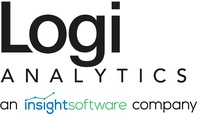Hanover Research and Logi Analytics examine how software teams view their level of data literacy
Logi Analytics, an insightsoftware company and the leading provider of embedded analytics solutions for software teams, released findings from a survey of software and application teams in their report titled 2021 State of Analytics: How Data Literacy Improves Decision-Making. The research explores how software leadership teams view their data literacy and reinforces the notion that users want valuable analytics in their work processes. 463 individuals across the U.S. – those employed by a digital/software or software/analytics organization with at least 200 employees working at the manager level or above — responded to the survey conducted by Hanover Research.
Organizations that achieve true data fluency have empowered their workforce with the tools to quickly make informed, data-driven decisions. However, according to the survey results, there is a disconnect in organizations’ perceived data literacy among both applications and end users. Very few organizations have an application functioning at the data challenged level (<1%) and about half are functioning at the data literate level (47%), with slightly more than one-third at the data aware level (38%), and a few functioning at the highest level of data fluent (15%).
Marketing Technology News: Influ2 to present at Gartner Marketing Symposium/Xpo
Definitions of data literate, data awareness, and data fluent for end users:
- Data challenged: End users have no-to-low levels of analytics skills or data access.
- Data literate: End users have achieved a comfort level working with, manipulating, analyzing and visualizing data
- Data awareness: End users can use a combination of past experiences, intuition, judgment and qualitative inputs in addition to data analysis to make decisions
- Data fluent: End users go beyond insights and instinct to communicate, collaborate, tell stories and drive ideas to make decisions using data
“With billions spent on stand-alone data discovery tools, many organizations assume their employees and applications are placed farther along the data literacy continuum than they actually are,” said Brett Hansen, CMO at Logi Analytics. “This research uncovers the inadequacies of how end users and applications perceive and understand data. When analytics are widely available, user-friendly, customizable, and easy to navigate, it leads to more accurate decision making.”
In addition to the misconception that most teams are data-literate, the survey found that teams also overestimate their applications’ ability to support data literacy. Eighty-six percent of survey respondents believe their applications can support data fluent end users. However, only 15% of applications are actually able to do so. To increase data literacy, organizations need applications that meet them at their level, are powerful, and easy-to-use.
“This report aimed to outline how most application teams are blind to their application’s analytical failings, and low analytics/BI adoption rates will perpetuate until this gap is recognized and applications invest in better analytics,” said James Wilcox, Senior Director at Hanover Research. “The results of the study indicate an overestimation of end users’ abilities and the analytics tend to be ineffective and underutilized, thus hurting the overall adoption.”
Other key findings include:
- Seventy-seven percent of organizations consider end-user data literacy “very” or “extremely important” to fast and accurate decision-making.
- Most application teams (75%) consider it “very” or “extremely important” to help users become more data literate.
- Less than 60% of end users are using even the most basic analytics capabilities
Marketing Technology News: Alluxio Praised for Technology Innovation in Cloud, Data Analytics and Data Management with Recent…












